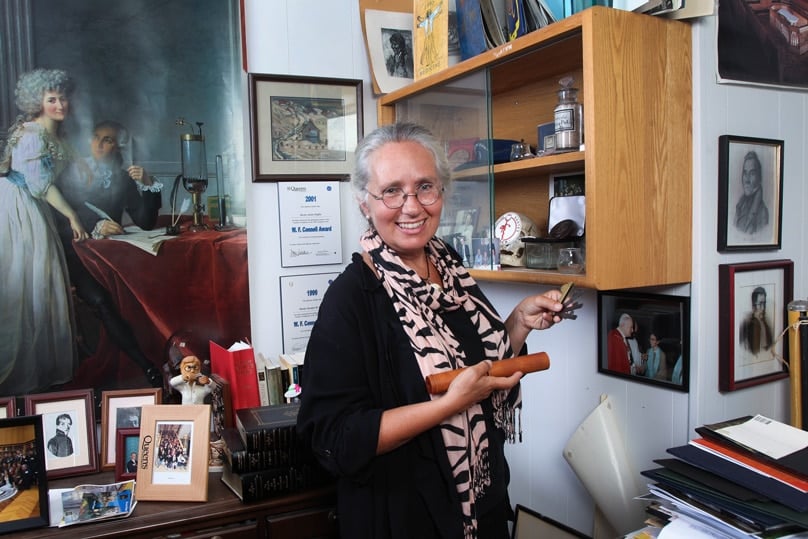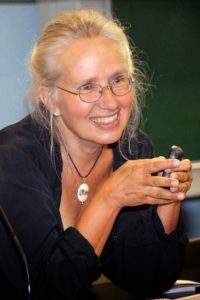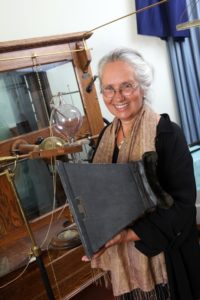
Miracle-expert Dr Jacalyn Duffin doesn’t sound like an atheist when she talks about the mysterious benefit of prayer and the witness of a saintly life. She says miracles happen, and are genuine wonders upon which only believers can shed some light. Her position has garnered attention all over the world – and controversy among the medical community.
The haematologist and medical historian at the Queen’s University in Ontario, Canada did her PhD thesis on the invention of the stethoscope, “as orthodox a topic as you can get”. Her passion for miracles began in 1987 after she was asked to review a series of blood marrow samples in a blind reading.
“I thought I was reading them for a lawsuit,” she says. “I was worried about having to face an aggressive lawyer in court, so I was really very careful when I was reading all these bone marrows and I couldn’t figure out what was going on when I got to the end of all that work.
“The story was very clear. The woman suffered acute myeloid leukaemia, a most aggressive type of the disease. She went into remission following treatment, relapsed, was treated and went into remission again. The final bone marrow was a remission marrow, but such was the diagnosis and the fact that I was reading these several years after the advent of the leukaemia, I assumed the patient was dead.”
She later discovered her report had been sent not to lawyers but to the Vatican, as an independent expert testimony in the case of a second miracle presented in the cause for the canonisation of Marie-Marguerite d’Youville, the founder of the Order of Sisters of Charity of Montreal (known as the Grey Nuns).
The former patient is still alive and well today, 40 years on – a fact Jacalyn has no answer for. And since the Church usually requires proof of a second miracle to elevate a person from the title of ‘Blessed’ to ‘Saint’, Marie-Marguerite d’Youville was declared the first Canadian-born saint in 1990 thanks to the Prof Duffin’s testimony.
After the ceremony Jacalyn suddenly realised the Vatican held a wealth of valuable information for a medical historian because of the role of medical testimony in its saint-making process.
She asked for and received permission to trawl through the Secret Vatican Archives and the Vatican library, painstakingly researching the last 400 years of the final miracles which paved the way for canonisations. Her resulting two books on the topic are Medical Miracles and Medical Saints.
You often mention your great surprise to find that the Church is reliant on the best-available medical science and independent expert witnesses in its canonisation process. Why?
I’m not Catholic and I brought a certain amount of assumptions and baggage with me as I set out. I think that the Church has to deal with what happened centuries ago with Galileo and things like that, which perhaps is where my expectation came from that the Church doesn’t want to know about this kind of thing. But as I went along and I realised that medical testimony was very important to these miracles, I was perplexed. Then I began to understand and respect why they are relied upon.

Why is that?
The Church has no difficulty in turning to scientific expertise because it just sees the work of science as part of our work on earth as ordained by God. They see no contradiction in questioning the world and what has happened by asking for scientific testimony along with religious testimony. Also it became clear to me that the Church values the third party as represented by the doctor. In many cases the doctor didn’t know about the cause or even the existence of the saint, and therefore is a witness who is neither for nor against the Church, they’re just there to give their perspective on what happened. The third point is that the doctor – whether it’s the treating physician or the expert witnesses that come along later – is invited to explain it as best they can scientifically. They’re not invited to say whether it is a miracle; that’s not their job. If a doctor cannot come up with a scientific explanation it doesn’t mean a miracle has happened, but it means that a miracle might have happened and it is up to the Church to determine that.
What in your opinion is a miracle of healing?
I think the determination rests first and foremost with the former patient, if she thinks that she was healed miraculously. I think that this happens thousands of times more than the Church pays attention to. The people who come forward with their sentiment that what caused their healing was a miracle are in many cases treated with suspicion. Extremely sceptical physicians won’t buy it, because they have a latent revulsion about things that are supposedly ‘supernatural’ or come from God. Even though it might be the same physician that said, “It’s time for the last rites, call the priest”. (But) If that patient thought that her healing had occurred miraculously, and I as her doctor have no explanation for why they are better, who am I to say she’s wrong and I’m right? My answer is no answer, and her answer is ‘God did it’. So for me these are stories of miracles because that’s how the former patients see them, the promoters of the cause see them, the Church finally sees them that way, and the doctors have no explanation.
What do you say to the argument against miracles that there is a scientifically explainable reason for the person getting better, but we just don’t have it yet?
I get that a lot. My boss, who was a great sceptic, thought I was wasting my time dealing with wishful thinking and fabrication. I told him I thought these stories are offered very sincerely. He said it doesn’t matter if they think they’re telling the truth or not, there’s always a natural explanation for the cure.
And you don’t agree?
My view is that with many of these cases, they’re wonders because medical science can’t explain them, either because they’re contemporary and we don’t have the answers, or they’re old and we weren’t given the evidence that we would seek to apply our own answers. We can’t impose our explanation on them because they didn’t gather the information we need. There was no x-ray, no blood scans or microbiological smears, none of the things that we examine today. So who are we to go back and change the diagnosis on these cases? That is what’s touching to me about the Church’s attitude to this. It accepts the tyranny of the time in which we live where there are a lot of things that we can’t explain. Many extraordinary cases of healing in the past cannot be explained even now. I told my boss all this and he said, “Well I don’t care, even if we never find a natural explanation for a cure, a natural explanation exists.”
That’s a very strong statement of faith, isn’t it?
Yes it is! I realised then that people who believe in the existence of a natural explanation, believe it in the absence of evidence. Just in the same way that people believe that God intervened through the intercession of the saints believe that they were helped in that way. Both of them are positions adopted in the absence of evidence. Religious people have no trouble with me pointing this out, but when I tell this to medical audiences they go bananas. They say that theirs is not a position of belief but one of truth – that they have a wisdom that is of a higher order than religious wisdom, in the absence of evidence. So I’ve discovered a lot about medicine and doctors as well as religion while doing this.
If faith in God isn’t necessary in order to believe that miracles happen, what is needed? Is it an attitude of openness to that sense of wonder? That we humans don’t have all the answers?
Yes, that’s exactly it in that that’s the pure definition of the word ‘miracle,’ wonder. These are miraculous healings in the absence of any good explanation, and they are things of wonder, so why not wonder at them and celebrate them?
How have your professional colleagues viewed your belief in miracles and religious devotion?
Some were upset; they were worried that I was going to ruin my reputation or that of the medical school or something.
But it amazes me that so many people are interested in my story, all around the world. I find it quite humbling that it got so much attention. It’s almost like it is work that needed to be done and people are hungry for it.
What are your thoughts on the role of faith and prayer in healing?
For Miracle Saints I reviewed the literature on that arm of medical research and it’s basically inconclusive, but a priest said the most convincing thing to me about that. He said that a miracle is in the particular and so if you were trying to do a randomised controlled trial on this and there are not good answers it’s irrelevant because a miracle is a singular event. However, I notice that patients who are faced by grave illness and who have a devout faith are deeply consoled by it. I think people can be envious of the fact that those who have faith derive a kind-of strange sense of comfort, a resignation towards whatever comes their way because they have confidence that they will be ok, and that their family will be ok after they’re gone. That’s not research though, that’s just a doctor talking about her experience.
Which case stands out for you as the most striking example of a miraculous healing?
The story that surprises me the most is the one I was involved with clinically as a haematologist. You sometimes can get a second remission but the rules, the canon or dogma of medicine tells us that remissions get shorter and shorter. This woman’s second remission has gone on for 40 years, and I can’t explain that. There are no cases like it in the world. There are a few cases like that where they’re still in the first remission, or they got a bone marrow transplant which completely changes the terrain, but at the time she became ill, bone marrow transplant was not readily available to everyone.
You mention some parallels between the study and practice of medicine and religion? What are they?
They have both evolved over centuries with humans observing our plight as people who suffer, and trying to figure out why we suffer and respond to that. Medicine and religion each have their canon or dogmas, too. For example, the rules for making saints are very clearly spelled out. We have a dogma in medicine, which is evidence-based medicine. We don’t switch from a tried and true treatment until there is evidence through randomised clinical trials that the new treatment is better than the old.

Why do you think Pope Francis has canonised some saints without requiring a second miracle?
I interviewed a number of the postulators who were working on the causes of the Canadian saints Bishop François de Laval and Marie of the Incarnation, and one said, “Well these saints aren’t going to be accused of working any miracles if nobody is praying to them”.
I thought that was lovely, and it was true. These were educators who did extraordinary things, but they weren’t spectacular and weren’t going to attract prayers from the blind and the lame that other saints would. One of the postulators pointed out that the need for miracles is a big hurdle for some people, for example in Africa, where if you claim to have had a medical miracle you need to show MRIs and cat-scans and they can’t muster the evidence that the Church demands. Several said that it’s also putting the emphasis on the spectacular, rather than on the heroic virtue of the saint’s life, which is really more important for those of us who come after, and the value of prayer even if you don’t get the miracle.
Have you formed any friendships as a result of your work on miracles?
I’m quite close to the doctor who was the treating physician. She is a very devout Catholic, and having this whole adventure happen to us which is very unique has brought us closer together. A couple of times I’ve taken a busload of medical students on a field trip to Montreal and I’ve asked the Grey Nuns if I can take them to the shrine which is their home, a 17th century building in the heart of Montreal where Mother d’Youville ran her soup kitchen and home for battered women. Here are these guys wearing turbans and girls with hijabs and Jews and Christians, and the occasional very devout Catholic medical student, and they get warmly received by these nuns who are there to tell their story of their founder and saint. I actually get tearful at that.
You have done all this research, believe miracles happen, are impressed by the Church’s response to them, have a good Catholic friend, but don’t believe in God?
My answer to that, although I do struggle with it, is that I think faith itself is a miracle. If you have faith, it is something to celebrate. There are many very wonderful benefits that come with faith, which is not why people choose to have faith of course, but to have faith is something that is very deep down inside. If I say I feel that, then it would be duplicitous of me and I’d be doing a disservice to the people who believe. Some believers get angry with me, but others tell me, “Well you’re very spiritual anyway, you just wait!”
